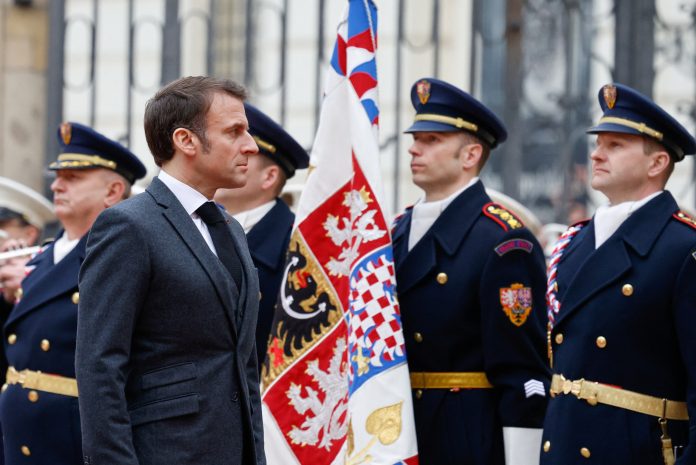Why has French President Emmanuel Macron’s position on the military conflict in Ukraine significantly hardened? Macron spent hours talking to Russian President Vladimir Putin in February 2022, while he constantly harps on the possibility of sending French troops to Ukraine and calls on other European leaders to “stop being cowards,” even though he is not actually taking any significant steps to help Kyiv, The Spectator reports.
The Wall Street Journal reported this week that Macron used secret conversations with President Joe Biden and German Chancellor Olaf Scholz to get them to change their approach to Ukraine.
Perhaps the French leader believes that France can thus make a strategic move that will turn it into a central player in Eastern Europe. However, in such a case, it is not clear why this boisterous rhetoric has not yet been backed up by a real military build-up at home and more military assistance to Ukraine.
France’s domestic policy may provide a plausible answer to this question. Faced with an onslaught of appeasers from the extreme left and extreme right, Macron has little to gain from acting as just another appeaser. Rather than trying to compete with them, it makes more sense for him to join them and unconditionally assume the Ukrainian mantle before other centrists – most notably the left-wing internationalist Raphael Glucksmann – take it away with him, according to The Spectator.
None of this is new to Macron. In a speech in Bratislava last May, he recognised that Eastern Europeans had correctly identified the Russian threat and that the West, including France, was wrong to downplay it.
At the same time, Macron is a master of his own version of political dialectics: pursuing contradictory policies at the same time, “en même temps.” His political movement initially borrowed policies – and recruited talent – from both the centre-right and centre-left to then leave both of France’s major parties in the dust. During Donald Trump’s years in office, Macron encouraged the European Union to take a more distanced approach to the US, while at the same time struck up a friendly relationship with the former US president.
Following this logic, we can assume that Macron will throw all of France’s energies into supporting Ukraine. Previously, France has not hesitated to join Hungary and Poland in seeking to restrict Ukraine’s agricultural exports to the EU. In addition to sugar, poultry and eggs, some cereals and honey will now be added to the list of goods subject to EU import restrictions.
More importantly, the base period used to calculate the annual limits has been expanded to include 2021, a pre-war year in which Ukrainian imports were very low. According to a European Commission spokesperson, for the affected Ukraine, the policy change could mean a loss of $1.2 billion in trade revenue, The Spectator reports.
Thus, there is a contradiction between “protecting” Europe from Ukrainian agricultural exports and continuing accession talks with Kyiv. When Ukraine joins the bloc, it will still have a highly competitive agricultural sector capable of “coddling” farmers across the EU as it does today. Worse, there is a contradiction between denying Ukraine market access and the need to mobilise financial support to keep its government afloat in times of war.
For Macron, domestic political considerations are very real, as evidenced by the mass protests of European farmers in the EU capital last week. Even the Polish government, for all its devotion to the Ukrainian cause, cannot afford to cross the country’s large farming community, seeing agricultural protectionism as the only way to keep the strongly rural Law and Justice party in opposition, according to The Spectator.
But the ease with which Europe’s self-proclaimed leader has turned to the protectionist playbook hardly inspires confidence in those who want France to back Ukraine. If Paris really saw Ukraine’s success as an existential issue, and in doing so wanted to allay the discontent of France’s and Europe’s agricultural sector, it would have many other options – such as the requirement to leave 4 per cent of farmland fallow to be eligible for EU subsidies, as well as other environmental standards – or rising fossil fuel prices.
Choosing some of these alternative paths would have to sacrifice some progress towards the EU’s climate goals. Compromises are the currency of politics, and the fact that Macron and Europe’s ruling circles chose to hurt Ukraine rather than question their commitment to decarbonisation at any cost says a lot about lingering complacency.
The fact that Emmanuel Macron has become a hardliner in his support for Kyiv is welcome – as is the fact that he is using the pulpit to shame other European governments into helping Ukraine. For now, however, no one should mistake Macron’s cautious political manoeuvring for a genuine sense of concern for Europe’s security. His bellicose rhetoric looks strange at the very least: instead of taking decisive action that could possibly help Ukraine on the frontline, he only shakes the air with his emotional statements.
